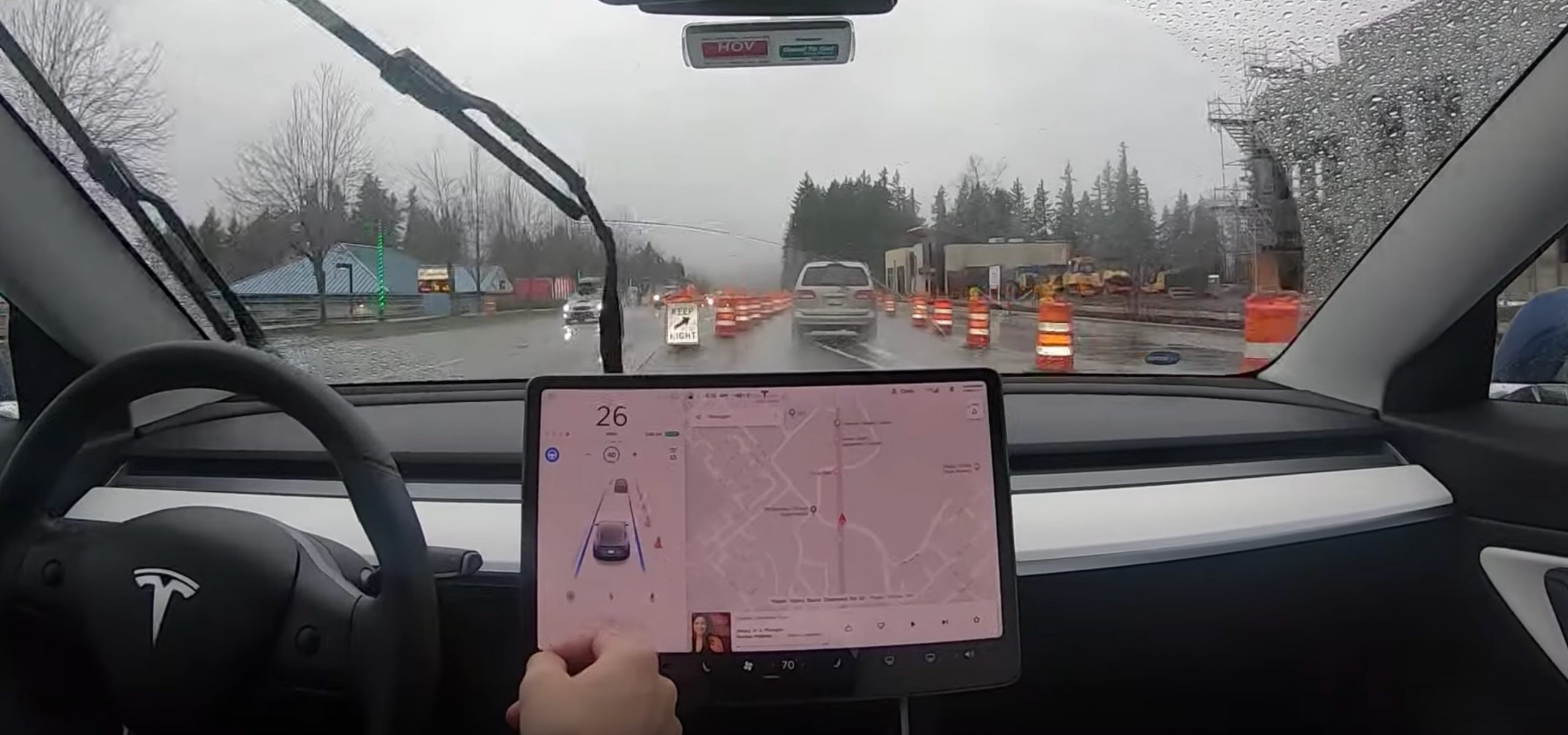
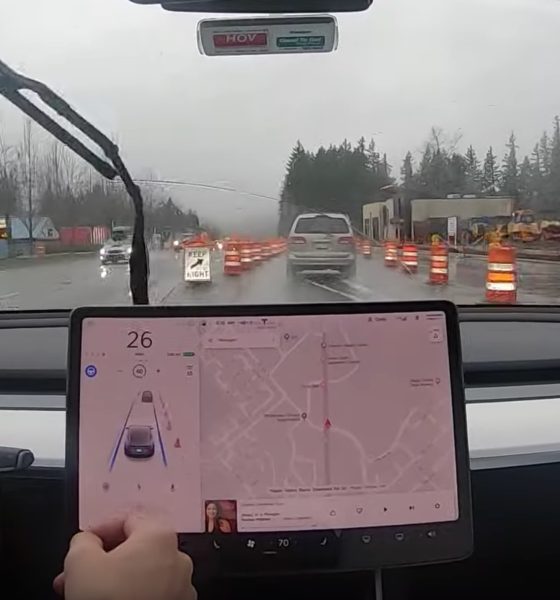
Tesla Model 3
Tesla Autopilot adapts to makeshift construction lane flanked by barriers on both side
A Tesla Model 3 owner has demonstrated the vehicle’s Autopilot system adapt to a busy construction zone with no lane markings.
YouTuber and Tesla enthusiast Cf Tesla took his Model 3 out while chronicling a ride for his “Rate this Drive” series. When approaching a section of the road currently under construction, Cf Tesla was curious to see if the Model 3 would steer away from the numerous barriers set up by crews working on the site. The vehicle recognized a series of cones according to the dash’s Driving Visualization feature and alerted the driver of the oncoming lane shift.
Cf Tesla noted he did not initially recognize the Model 3 shifting away from the construction barriers, but soon realized that the vehicle began maneuvering through a makeshift lane that was flanked by onstruction cones on both sides.
“It’s rerouting itself because of the cones. The road did not just go there…This is not the normal road that we drive on, guys. This is something entirely new and it is figuring it out right now on its own. There’s no lines, it’s using the cones as the “sideline” for this road,” Cf Tesla said.
In October, Tesla CEO Elon Musk announced that the Driving Visualization feature on a vehicle’s dash screen would soon begin to recognize and render traffic cones as an extra safety precaution. The addition of traffic cones and barriers would increase driver awareness by illustrating the barriers that are present on the road on the screen of the car. This is an especially helpful feature at night when visibility is limited to only reflective tape on the cones. This feature was introduced in early November upon the release of Software Update 2019.36.1.
Perhaps the vehicle also recognized that it was traveling within a construction zone due to the multiple cones it rendered on the screen. As a result of this, Cf Tesla was unable to adjust the speed of his vehicle by using the right scroll wheel. This feature is beneficial to pedestrians and workers inside a construction zone. The speed limit inside a construction zone varies from state to state, but the car seemed to recognize that 25 MPH was the maximum speed in the area he was traveling.
Tesla’s Full Self Driving suite was designed to make traveling in a car safer for everyone. Judging upon what took place in this video, it is safe to say the software’s continuous improvements are increasing the reliability and safety of the Full Self Driving capability available to Tesla owners. Including the recognition of construction cones as lane barriers and taking away the freedom to go above the speed limit within a road work zone increases safety for drivers, pedestrians, and workers alike.
You can watch Cf Tesla’s video of his Model 3 recognizing a construction zone and adapting to lane shifts below.

News
Tesla is making two big upgrades to the Model 3, coding shows
According to coding found in the European and Chinese configurators, Tesla is planning to make two big upgrades: Black Headliner offerings and a new 16-inch QHD display, similar to that on the Model Y Performance.
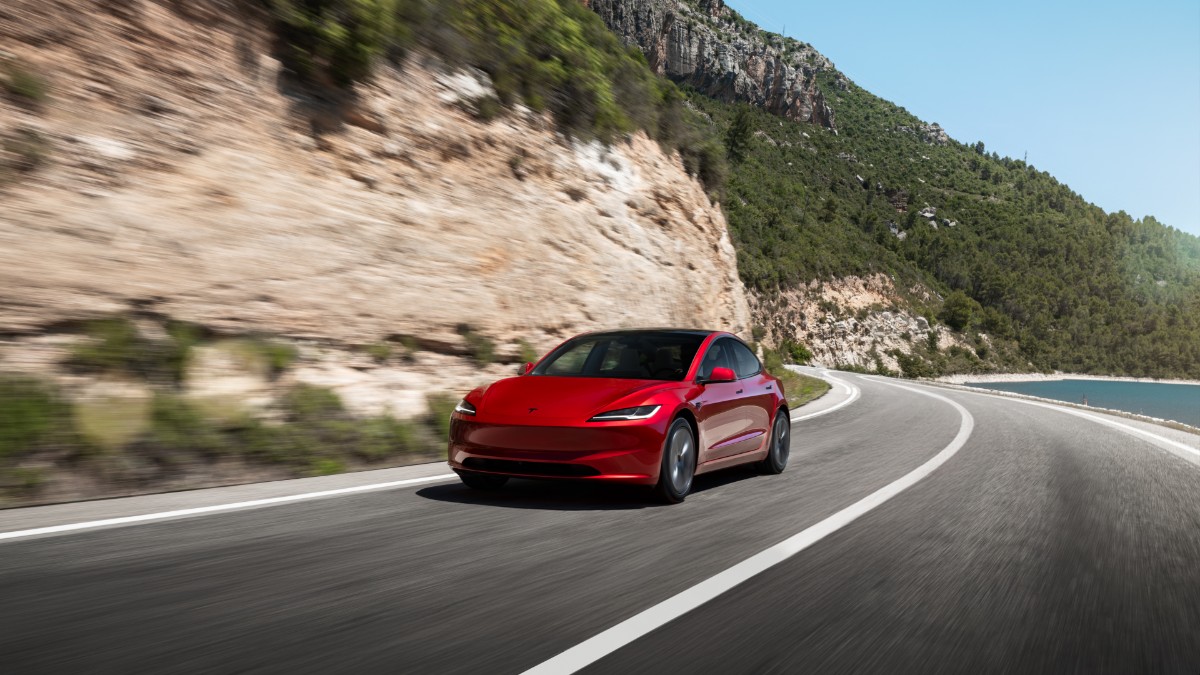
Tesla is making two big upgrades to the Model 3, one of which is widely requested by owners and fans, and another that it has already started to make on some trim levels of other models within the lineup.
The changes appear to be taking effect in the European and Chinese markets, but these are expected to come to the United States based on what Tesla has done with the Model Y.
According to coding found in the European and Chinese configurators, Tesla is planning to make two big upgrades: Black Headliner offerings and a new 16-inch QHD display, similar to that on the Model Y Performance.
These changes in the coding were spotted by X user BERKANT, who shared the findings on the social media platform this morning:
🚨 Model 3 changes spotted in Tesla backend
• New interior code: IN3PB (Interior 3 Premium Black)
• Linked to Alcantara-style black headliner
• Mapped to 2026 Model 3 Performance and Premium VINs• EPC now shows: “Display_16_QHD”
• Multiple 2026 builds marked with… pic.twitter.com/OkDM5EdbTu— BERKANT (@Tesla_NL_TR) February 23, 2026
It appears these new upgrades will roll out with the Model 3 Performance and Tesla’s Premium trim levels of the all-electric sedan.
The changes are welcome. Tesla fans have been requesting that its Model 3 and Model Y offerings receive a black headliner, as even with the black interior options, the headliner is grey.
Tesla recently upgraded Model Y vehicles to this black headliner option, even in the United States, so it seems as if the Model 3 will get the same treatment as it appears to be getting in the Eastern hemisphere.
Tesla has been basically accentuating the Model 3 and Model Y with small upgrades that owners have been wanting, and it has been a focal point of the company’s future plans as it phases out other vehicles like the Model S and Model X.
Additionally, Tesla offered an excellent 0.99% APR last week on the Model 3, hoping to push more units out the door to support a strong Q1 delivery figure at the beginning of April.
News
Tesla dominates JD Power EV Satisfaction ranking, grabbing top two spots
The Model 3 was the highest ranking EV considered, with a score of 804, followed by the Model Y at 797, the BMW i4 at 795, and the BMW iX at 794.
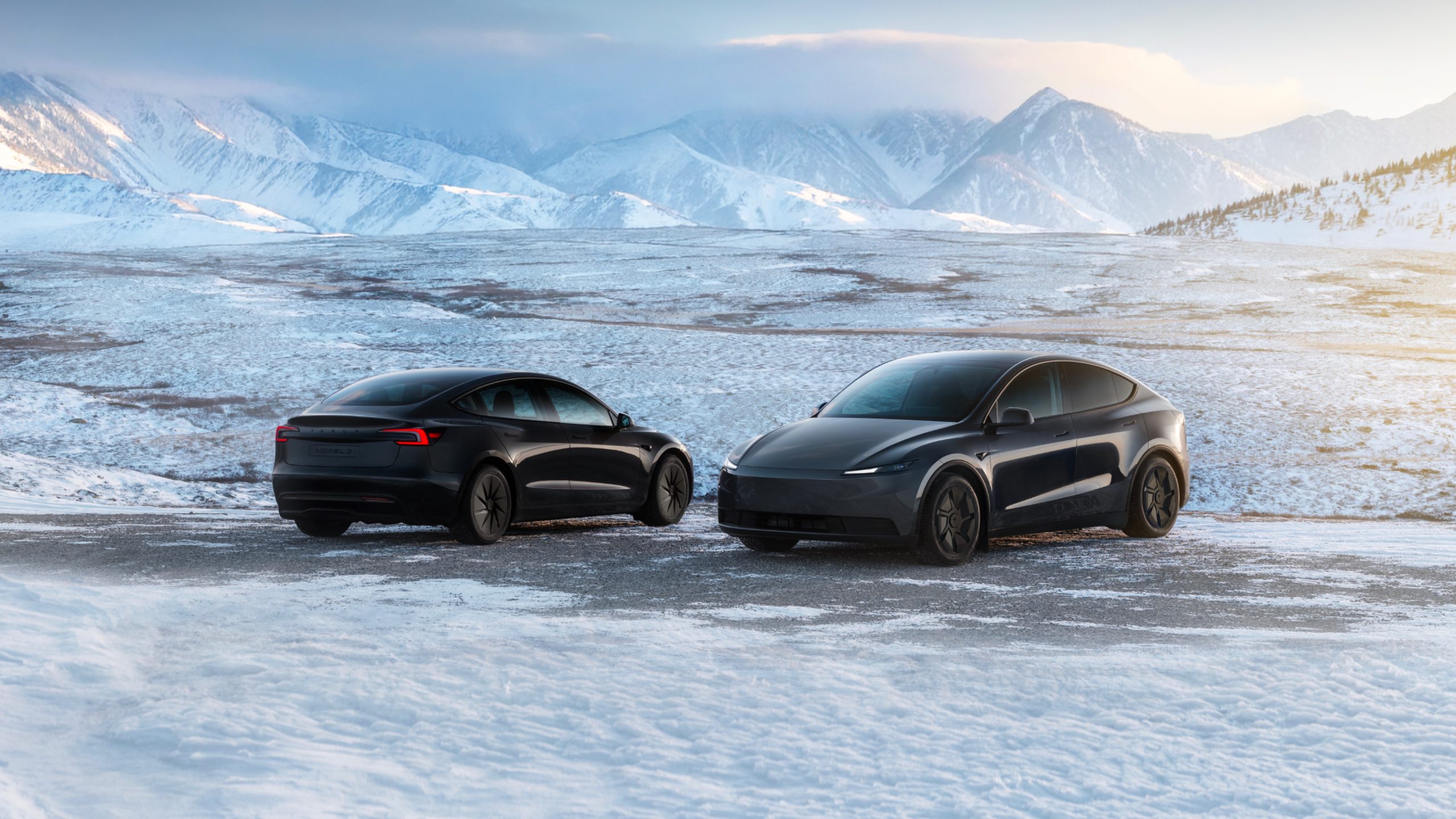
Tesla dominated JD Power’s EV Owner Satisfaction ranking for 2026, grabbing the top two spots in the survey with the Model 3 and Model Y.
The two Tesla models grabbed the first and second spots, respectively, with scores of 804 and 797 out of 1,000 possible points.
Brent Gruber, Executive Director of JD Power’s EV practice, said:
“EV market share has declined sharply following the discontinuation of the federal tax credit program in September 2025, but that dip belies steadily growing customer satisfaction among owners of new EVs. Improvements in battery technology, charging infrastructure, and overall vehicle performance have driven customer satisfaction to its highest level ever. What’s more, the vast majority of current EV owners say they will consider purchasing another EV for their next vehicle, regardless of whether they benefited from the now-expired federal tax credit.”
JD Power’s study showed three key findings: Public charging satisfaction was higher than ever, premium BEVs saw more pronounced quality improvements, and BEVs held their satisfaction ratings compared to plug-in hybrid electric vehicles (PHEVs).
Tesla Grabs Top 2 Spots
Despite what some publications might try to make you believe, Tesla is still the cream of the crop when it comes to EV ownership, and real-world owners surveyed by JD Power will prove that to you.
The Model 3 was the highest ranking EV considered, with a score of 804, followed by the Model Y at 797, the BMW i4 at 795, and the BMW iX at 794. The segment average for “Premium Battery Electric Vehicles” was 786. The Cadillac OPTIQ (762), Rivian R1S (758), Lucid Air (740), Rivian R1T (739), and Audi Q6 e-Tron (690) all finished below that threshold.
Meanwhile, a separate category for “Mass Market Battery Electric Vehicles” had the Ford Mustang Mach-E as the EV with the highest rating at 760. The segment average for this class was 727.
🚨 Tesla topped J.D. Power’s new EV Owner Satisfaction Study for 2026, with the Model 3 (804) and Model Y (797) being the top-rated vehicles, beating out the BMW i4 (795) and iX (794)
Additionally, Tesla Superchargers helped public charging satisfaction rise to new highs:
“The… pic.twitter.com/4WIxoDxHig
— TESLARATI (@Teslarati) February 19, 2026
Tesla Supercharging Improves Public Charging Satisfaction
JD Power said the availability of public charging is “by far the most improved index factor,” and that the consistent growth of publicly available charging has helped push many consumer sentiments in a positive direction.
Most of this is due to the Tesla Supercharger Network and its expansion. However, Tesla owners are also becoming more satisfied with the infrastructure after expanding access to other EV brands, the study said.
News
Tesla Model 3 wins Edmunds’ Best EV of 2026 award
The publication rated the Model 3 at an 8.1 out of 10, and with its most recent upgrades and changes, Edmunds says, “This is the best Model 3 yet.”
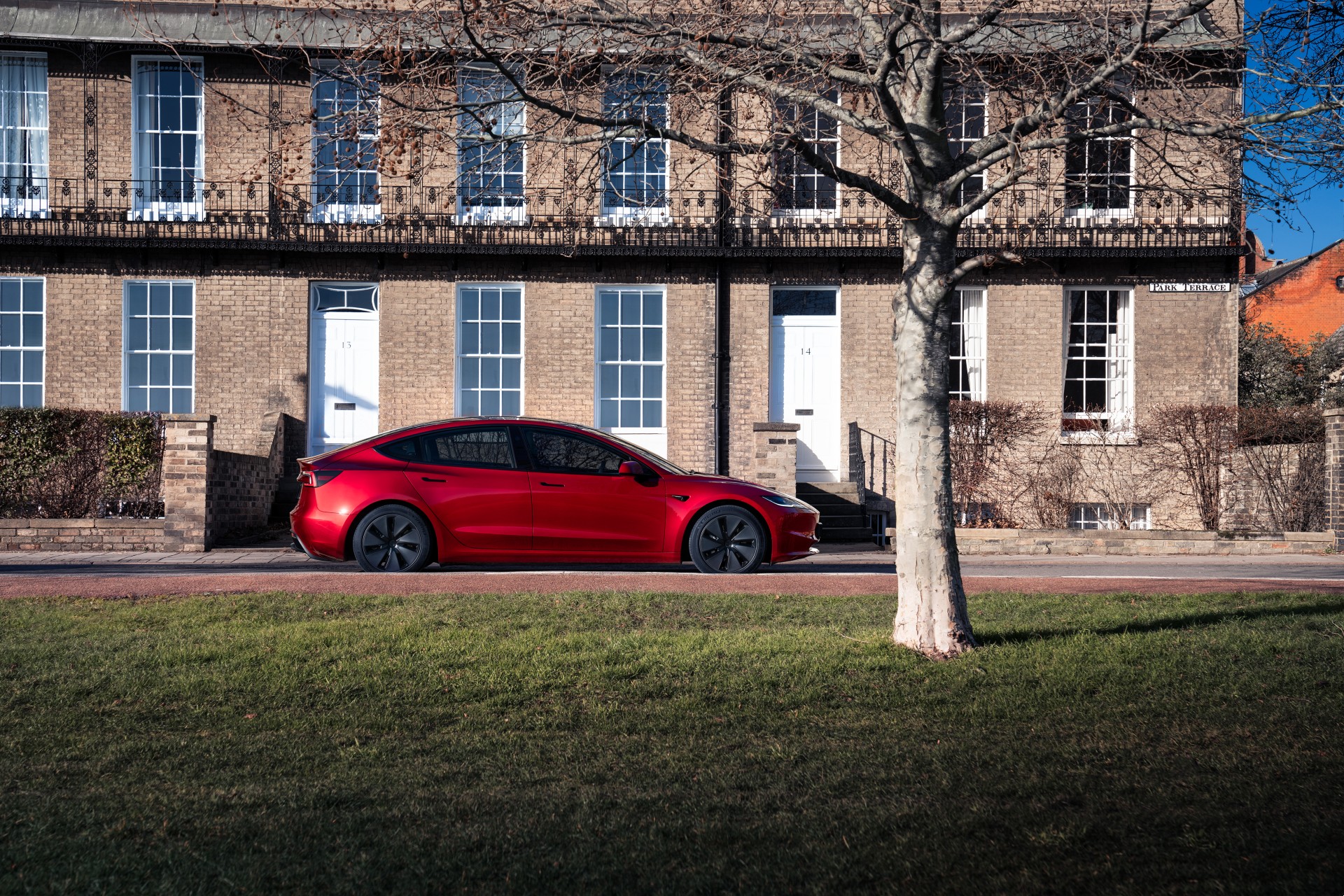
The Tesla Model 3 has won Edmunds‘ Top Rated Electric Car of 2026 award, beating out several other highly-rated and exceptional EV offerings from various manufacturers.
This is the second consecutive year the Model 3 beat out other cars like the Model Y, Audi A6 Sportback E-tron, and the BMW i5.
The car, which is Tesla’s second-best-selling vehicle behind the popular Model Y crossover, has been in the company’s lineup for nearly a decade. It offers essentially everything consumers could want from an EV, including range, a quality interior, performance, and Tesla’s Full Self-Driving suite, which is one of the best in the world.
The Tesla Model 3 has won Edmunds Top EV of 2026:
“The Tesla Model 3 might be the best value electric car you can buy, combining an Edmunds Rating of 8.1 out of 10, a starting price of $43,880, and an Edmunds-tested range of 338 miles. This is the best Model 3 yet. It is… pic.twitter.com/ARFh24nnDX
— TESLARATI (@Teslarati) February 18, 2026
The publication rated the Model 3 at an 8.1 out of 10, and with its most recent upgrades and changes, Edmunds says, “This is the best Model 3 yet.”
In its Top Rated EVs piece on its website, it said about the Model 3:
“The Tesla Model 3 might be the best value electric car you can buy, combining an Edmunds Rating of 8.1 out of 10, a starting price of $43,880, and an Edmunds-tested range of 338 miles. This is the best Model 3 yet. It is impressively well-rounded thanks to improved build quality, ride comfort, and a compelling combination of efficiency, performance, and value.”
Additionally, Jonathan Elfalan, Edmunds’ Director of Vehicle Testing, said:
“The Model 3 offers just about the perfect combination of everything — speed, range, comfort, space, tech, accessibility, and convenience. It’s a no-brainer if you want a sensible EV.”
The Model 3 is the perfect balance of performance and practicality. With the numerous advantages that an EV offers, the Model 3 also comes in at an affordable $36,990 for its Rear-Wheel Drive trim level.








